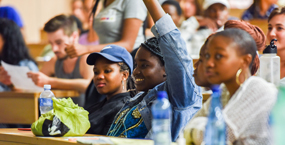
|

|

|
Relations Strategist provides a range of services including case management advice and support to respondents, mediation services, training and awareness raising.
Case management
UCT policies make provision for the separation of the support and advice services when dealing with survivors and (alleged) respondents, or those accused of transgressing the policies (hereafter called respondents). Survivor Support assists and supports survivors while the Relations Strategist gives advice and support to respondents. This will include guidance on:
- Formal and informal routes: in terms of UCT policies and the differences and structures in which these operate. Informal interventions will be in line with existing UCT policies and guidelines, and in accordance with the wishes and best interests of affected parties.
- Advisory panel: what to do and expect if and when a matter or a case is referred to an Advisory Panel.
Mediation services
Staff and students have been trained to assist the campus community to engage constructively with differences through mediation. Single party as well as group mediations are available, and requests for external mediation are also coordinated in line with the UCT Mediation Policy.
Training
Training interventions and activities are provided for line managers, transformation committees and student leadership. Training and information sharing sessions deal with UCT policies pertaining to sexual harassment, sexual offences, racism and racial harassment, as well as mediation. The training includes case studies, problem-areas within the policies, and exploring and collecting best practices.
Mediation training
Comprehensive training and re-training is provided for UCT staff and student mediators. Mediators are recruited, but are also welcome to enquire at the OIC for possible enlisting and training. All activities, monitoring and structures dealing with mediation are regulated by the UCT Mediation Policy.
Advocacy and awareness-raising
A range of activities is available for staff and students within the context of diversity and sensitivity training at UCT. Examples of interventions that are available include:
- Policy Development: one of the most crucial areas that has been identified for reform, is the Sexual Offences Policy, and in particular the introduction of a specialised sexual offences court at UCT. The exploration and implementation of such a structure, its operation and resources to make it function is underway.
- Empathic engagement: interventions and workshops, based on campus experience, cases and lessons learnt from working intimately with members of the campus community are available. Interventions (for staff and students) are designed according to the needs of specific members of the campus community, or a working team. The dialogue attempts to initiate conversations around identities and lived experiences to help create a more inclusive and kinder working environment.
